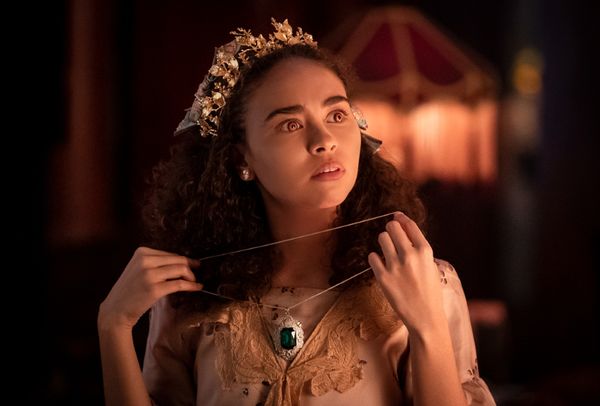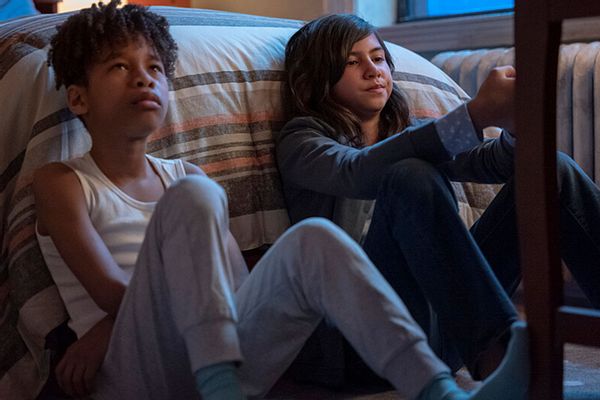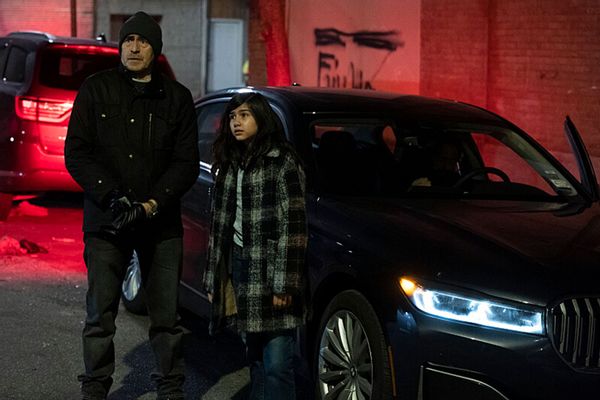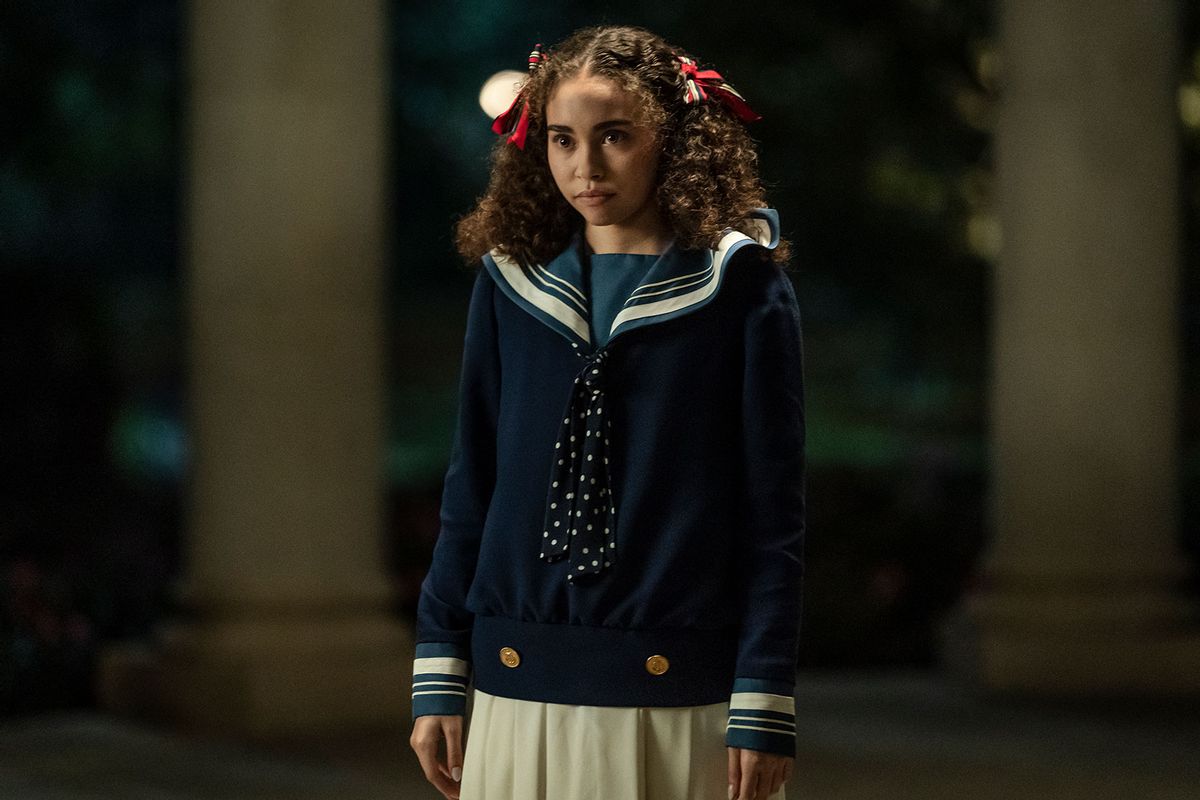Some things are spoiled for you once you're a parent. Staying up past midnight. Sleeping in. Last-minute plans with friends, and often, films or television where children are in danger (basically, Stephen King's and Steven Spielberg's oeuvre). But although many parents and guardians shy away from stories where children face harm, one wound directed at children in recent television is particularly and sneakily terrible.
The vampire child.
In theory, a child turned into a vampire would be a parents' dream, at least according to ye olde moms of Instagram, where some post filtered photos of their darling kids with sappy captions like never grow up. But the eternal child is a tragic figure. From "Interview with the Vampire" to "Let the Right One In," it's a nightmare of powerlessness and always, a symbol of an adult's bad decision.
Name the most horrific moment in "The Walking Dead." For me, it might have to be the scene where Carol is reunited with her missing child, as the girl bursts out of the barn. She is, naturally, a zombie, and Carol still tries to run to her arms, sobbing. I believe I checked out of the series for quite some time after that. The zombie kid is creepy, a cheap and easy shot at the grotesque. Remember the zombie baby from "Dawn of the Dead"? Zombie children are unnerving, approaching the uncanny valley flinch response of "this can't be real."
By giving her a little more life lived, the series also gives Claudia a lot more life lost.
But vampires? Vampires are cool. Vampires are smart. Vampires know what they are, unlike most zombies who know only chomping. If a child is turned into a vampire, they still retain themselves, albeit with a little of the squirmy fiendishness vampires are known for (and frankly, some kids are known for). One of the most wonderful aspects of Bailey Bass' all-around wonderful portrayal of child vampire Claudia in the new "Interview with the Vampire" series is that she still seems very much to be a teen, scribbling in her diaries, starry-eyed over love.
 Bailey Bass as Claudia in "Interview with the Vampire" (Alfonso Bresciani/AMC)She's a teen forever, though. And those eyes? They've turned a devilish shade, as have the eyes of her "Daddy Lou" (Jacob Anderson), who hides his eyes from his extended, non-vampiric family behind tinted glasses. After Lestat (Sam Reid) turns the girl into a vampire at his lover Louis' desperate request, Claudia attacks her new role with vigor, learning everything. She is a child, after all, and children are sponges. There's no longing for her old life, at least not yet. But we the viewers long for it. We know what she's given up, without even being asked.
Bailey Bass as Claudia in "Interview with the Vampire" (Alfonso Bresciani/AMC)She's a teen forever, though. And those eyes? They've turned a devilish shade, as have the eyes of her "Daddy Lou" (Jacob Anderson), who hides his eyes from his extended, non-vampiric family behind tinted glasses. After Lestat (Sam Reid) turns the girl into a vampire at his lover Louis' desperate request, Claudia attacks her new role with vigor, learning everything. She is a child, after all, and children are sponges. There's no longing for her old life, at least not yet. But we the viewers long for it. We know what she's given up, without even being asked.
Child vampires never consent.
A kid vampire would be a target, were they not themselves a predator.
The new AMC "Interview" series smartly ages Claudia up, both from her very young age in Anne Rice's novel and from her slightly older age in the 1994 film, where a young Kirsten Dunst in ringlets won a Golden Globe nom for Best Actress. Claudia is older in the series, a young teen. Remember being 14? What about being 14 forever? Stuck in a confusing time of hormones, the series' Claudia is poised on the brink of adulthood but will never move forward, never grow out of her shifting moods and dramatic fantasies.
Claudia is in reach of but just out of sight of many of life's milestones. Most of us have had the experience of losing a first love. But accidentally eating them? By giving her a little more life lived, the series also gives Claudia a lot more life lost.
Perhaps Claudia is also aged up in the show because a little kid vamp? It's disturbing on multiple levels. The role can sexualize children, as in 2009's "Orphan" (though that adult child is all human): a child pretending to be an adult pretending to be a child. It's creepy. Continually mistaken for younger than her undead years, Claudia deals with insults, sneers and confusion. A kid vampire would be a target, were they not themselves a predator.
 Ian Foreman as Isaiah Cole and Madison Taylor Baez as Eleanor Kane in "Let The Right One In" (Francisco Roman/SHOWTIME)
Ian Foreman as Isaiah Cole and Madison Taylor Baez as Eleanor Kane in "Let The Right One In" (Francisco Roman/SHOWTIME)
However a child vampire is made, they represent an adult's mistake, a moment of weakness.
A parent or protector can never stop watching out for a child vampire. It's aged Mark (Demián Bichir), the father of child vampire Eleanor (Madison Taylor Baez) in Showtime's "Let the Right One In," the new series adapted from the films. When Eleanor meets and befriends the neighbor boy, the heart-tugging Ian Foreman as bullied Isaiah, her father expresses concern. But Eleanor knows he's not a typically protective father: "You're not worried about me. You're worried I'd do something to him."
However a child vampire is made, they represent an adult's mistake, a moment of weakness, poor judgment. Claudia was made due to Louis' guilt, the girl trapped in a fire started because of something he did. Nearly consumed by the flames, Louis rescues her, and turning her into a vampire is the only way to save her. But what is he saving her for?
 Demián Bichir as Mark Kane and Madison Taylor Baez as Eleanor Kane in "Let The Right One In" (Francisco Roman/SHOWTIME)What kind of life does a child vamp have? Eleanor travels in a trunk, denied food. Although a powerful vampire, she's at the mercy of the one who cares for her, a father who makes rules when she's technically far too old for them. All children outgrow their family home, but children vampires outgrow their families, outlive them, without being able to grow at all. The resentment is strong as parent/child (or maker/child) roles reverse but never fully. A child vamp can never do anything fully, trapped in a body that cannot hold the experiences of their brain.
Demián Bichir as Mark Kane and Madison Taylor Baez as Eleanor Kane in "Let The Right One In" (Francisco Roman/SHOWTIME)What kind of life does a child vamp have? Eleanor travels in a trunk, denied food. Although a powerful vampire, she's at the mercy of the one who cares for her, a father who makes rules when she's technically far too old for them. All children outgrow their family home, but children vampires outgrow their families, outlive them, without being able to grow at all. The resentment is strong as parent/child (or maker/child) roles reverse but never fully. A child vamp can never do anything fully, trapped in a body that cannot hold the experiences of their brain.
Want a daily wrap-up of all the news and commentary Salon has to offer? Subscribe to our morning newsletter, Crash Course.
The aberrant child vampire highlights inequality, a deviant even among deviants. Someone's got to be at the bottom of the bloodsucker rung, and it's the kid vamps who have no power, no say and no future. As the supernatural creature's popularity surges, children are, as always, the ones without a voice, the ones left behind.
Read more
about vampires

Shares